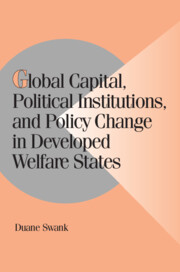Book contents
- Frontmatter
- Contents
- List of Figures and Tables
- Preface
- 1 INTRODUCTION
- 2 GLOBALIZATION, DEMOCRACY, AND THE WELFARE STATE
- 3 GLOBAL CAPITAL, POLITICAL INSTITUTIONS, AND CONTEMPORARY WELFARE STATE DEVELOPMENT: QUANTITATIVE ANALYSIS
- 4 BIG WELFARE STATES IN GLOBAL MARKETS: INTERNATIONALIZATION AND WELFARE STATE REFORM IN THE NORDIC SOCIAL DEMOCRACIES
- 5 GLOBALIZATION AND POLICY CHANGE IN CORPORATIST CONSERVATIVE WELFARE STATES
- 6 INTERNATIONALIZATION AND LIBERAL WELFARE STATES: A SYNOPSIS
- 7 ASSESSING LONG-TERM IMPACTS: THE EFFECT OF GLOBALIZATION ON TAXATION, INSTITUTIONS, AND CONTROL OF THE MACROECONOMY
- 8 CONCLUSIONS: NATIONAL WELFARE STATES IN A GLOBAL ECONOMY
- APPENDIX A Data Sources
- APPENDIX B Alternative Estimators
- References
- Index
- Titles in the series
2 - GLOBALIZATION, DEMOCRACY, AND THE WELFARE STATE
Published online by Cambridge University Press: 13 January 2010
- Frontmatter
- Contents
- List of Figures and Tables
- Preface
- 1 INTRODUCTION
- 2 GLOBALIZATION, DEMOCRACY, AND THE WELFARE STATE
- 3 GLOBAL CAPITAL, POLITICAL INSTITUTIONS, AND CONTEMPORARY WELFARE STATE DEVELOPMENT: QUANTITATIVE ANALYSIS
- 4 BIG WELFARE STATES IN GLOBAL MARKETS: INTERNATIONALIZATION AND WELFARE STATE REFORM IN THE NORDIC SOCIAL DEMOCRACIES
- 5 GLOBALIZATION AND POLICY CHANGE IN CORPORATIST CONSERVATIVE WELFARE STATES
- 6 INTERNATIONALIZATION AND LIBERAL WELFARE STATES: A SYNOPSIS
- 7 ASSESSING LONG-TERM IMPACTS: THE EFFECT OF GLOBALIZATION ON TAXATION, INSTITUTIONS, AND CONTROL OF THE MACROECONOMY
- 8 CONCLUSIONS: NATIONAL WELFARE STATES IN A GLOBAL ECONOMY
- APPENDIX A Data Sources
- APPENDIX B Alternative Estimators
- References
- Index
- Titles in the series
Summary
In this chapter, I examine the international capital mobility thesis, namely, that notable post-1970 rises in transnational capital mobility have significantly diminished the capacity of democratically elected governments to pursue social welfare policies that depart from market-conforming principles. I initially provide an overview of the internationalization of markets, focusing especially on trends in the liberalization of capital controls, international capital flows, and financial market integration. Next, I offer an exegesis of the theory of diminished democracy, outlining the economic and political logics that link capital mobility to retrenchment and neoliberal restructuring of the welfare state. I also confront the theory with the counterclaim that, in reality, the postwar structure of embedded liberalism, or the combination of international liberalism with substantial state intervention and social compensation, continues to have relevance to the contemporary period. Finally, I devote the bulk of the chapter to the development of my alternative argument that the institutional structure of the polity and welfare state – national systems of group and electoral interest representation, the organization of policy-making authority within the polity, and programmatic structures of welfare states – determine the direction and magnitude of the social policy impacts of internationalization. I conclude with an empirical analysis of focal dimensions of national institutions, an exercise that sets the stage for the empirical assessments of theory in subsequent chapters.
International Capital Mobility: An Overview
Facilitated by national policy change, technological innovations, new financial institutions, and market forces, international flows of capital and the potential for such movements have increased notably since the early 1970s.
- Type
- Chapter
- Information
- Publisher: Cambridge University PressPrint publication year: 2002



